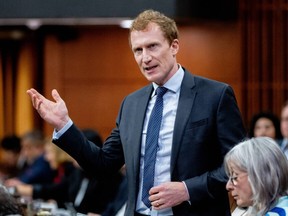The premiers of Alberta, New Brunswick and Nova Scotia say their provinces can’t handle an influx of asylum claimants without federal assistance

OTTAWA – Immigration Minister Marc Miller accused the premiers of Nova Scotia, New Brunswick and Alberta of weaponizing a working group on asylum seekers and distorting the issue for their own political gains.
Miller established a working group over the summer with provincial immigration and jobs ministers to look at ways to reduce the pressure on Ontario and Quebec, where most asylum seekers now enter the country. The asylum seekers can put a strain on housing and other social services while they await adjudication of their claims.
Alberta Premier Danielle Smith said last week her province wouldn’t take any asylum claimants, especially not without some form of federal cash.
“Alberta’s government is opposed to the federal government’s plan to relocate tens of thousands of asylum claimants to Alberta, especially without any financial assistance to support the province in doing so,” she said on the social media site X. “Excessive levels of immigration to this province is increasing the cost of living and strains public services for everyone.”
https://x.com/ABDanielleSmith/status/1834289858300502210
New Brunswick Premier Blaine Higgs said his province was a welcoming place, but couldn’t afford 4,600 asylum claimants at their doorstep.
“We are calling on the Liberal government to drop this plan, and instead, deal with the backlog of asylum claims that their failed policies have created,” he said online.
Nova Scotia Premier Tim Houston also rejected any movement of asylum claimants to his province. On Wednesday, he defended his comments and said it was about standing up for his province.
“In the last few weeks, federal Liberals called Nova Scotians ‘EI folks’ and ‘idiots.’ It shows what they really think of people here and it’s entirely condescending. We stood up to the federal government on the carbon tax, asylum seekers and numerous other files. I’m standing up for the people of our province — the rest of the Liberal MPs from Nova Scotia should do the same,” he said in a statement.
Miller on Wednesday said the three premiers’ comments were based on hypothetical numbers that were created by a working group of immigration ministers from across the country. He said it was simply a calculation of the number of asylum claimants Canada has seen divided by the share of a province’s population.
“There was a lot of good faith at that table, but, sadly, three particularly conservative ministers have stood up, the premiers of Nova Scotia, of New Brunswick and Alberta, and decided to weaponize this working group,” he said.
He said premiers had previously all agreed that it was unfair to have Quebec and Ontario carry so much of the burden of caring for asylum seekers.
He said he had hoped the working group would help address this issue, but it was never the government’s plan to simply force asylum seekers to other provinces or to do so without compensation to those provinces.
“Let me restate: Ontario and Quebec are doing more than their fair share and the other provinces need to step up. But there was no point in time where anyone said that the federal government was going to impose 1,000s of asylum seekers on unprepared provinces.”
Higgs was expected to call an election on Thursday, while Nova Scotians will go to the polls in 2025 and Smith faces a party leadership review later this year. Miller said those political concerns were driving the premiers’ comments.
Miller’s main announcement on Wednesday was a reduction in the number of international students Canada would accept in the coming years.
The government put the first cap on the program last year, reducing the number to 485,000. Miller said the number for 2025 and 2026 will be reduced by a further 10 per cent, down to 437,000.
He also included graduate students under the cap for the first time and announced there will be more changes to post-graduate work permits coming.
Miller said he knows the cap has led to turbulence for schools, but he is trying to send a clear message that the number of students won’t grow again.
“If they adjust their practices, get quality students, make sure those students have the means to stay here, that’s fine,” he said. “But when it comes to the numerical amount of students that come into this country, we fixed that cap.”
Our website is the place for the latest breaking news, exclusive scoops, longreads and provocative commentary. Please bookmark nationalpost.com and sign up for our politics newsletter, First Reading, here.